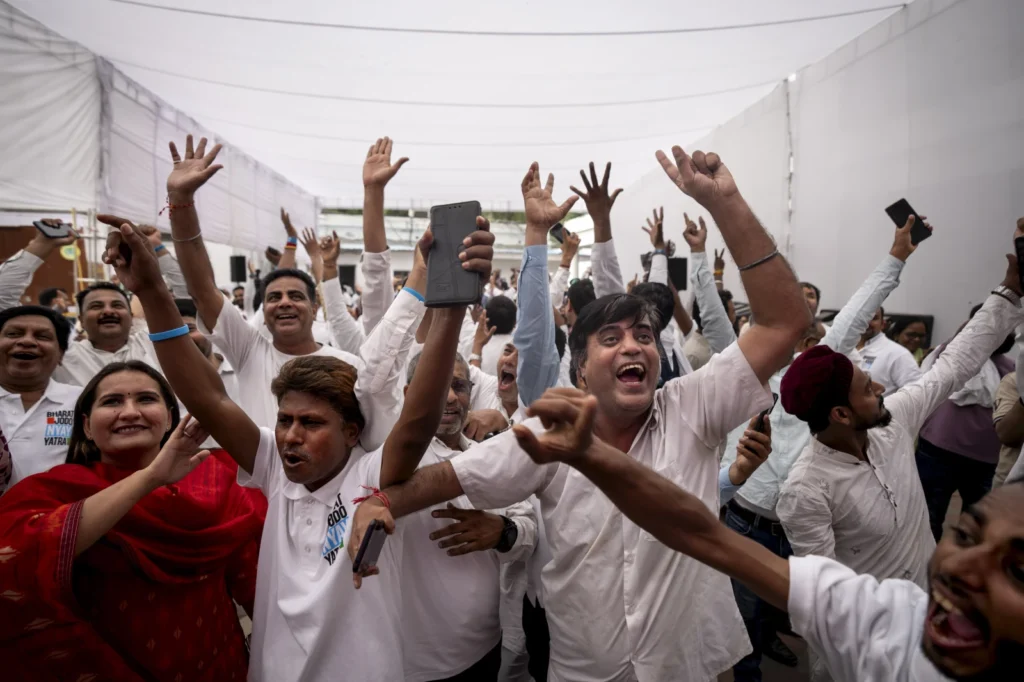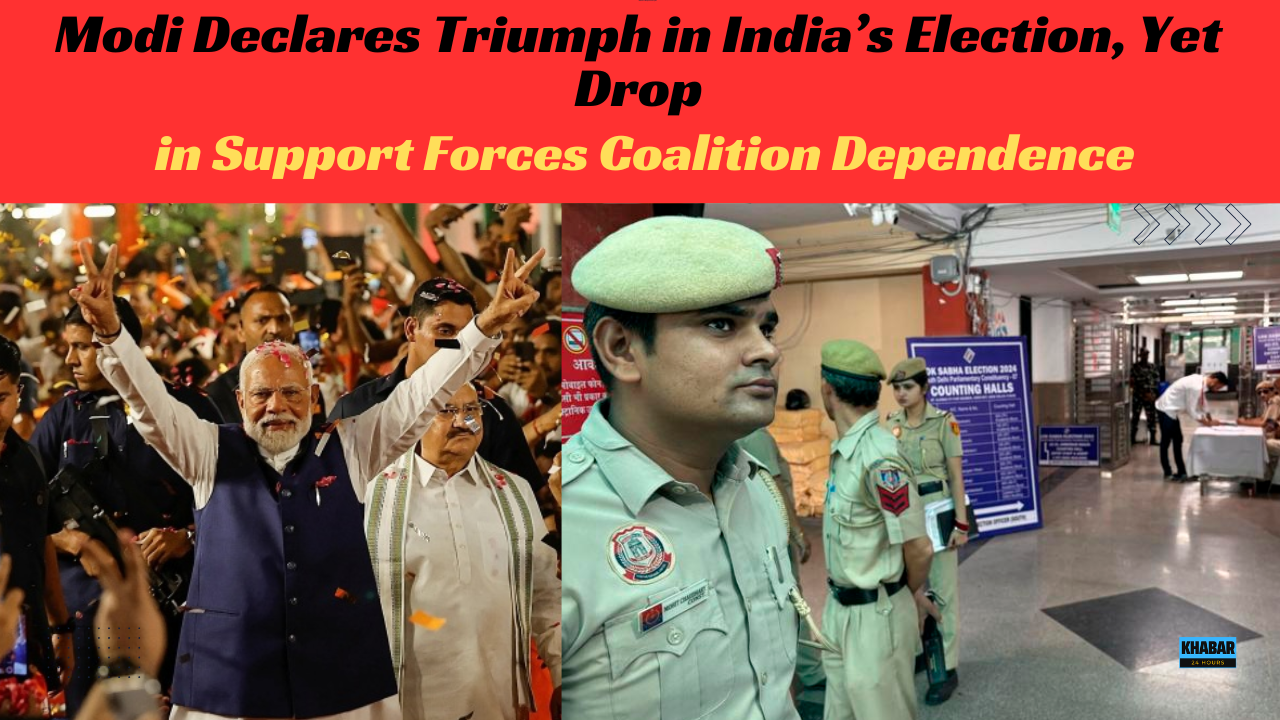Prime Minister Narendra Modi announced victory for his alliance in India’s general election, asserting a mandate to pursue his agenda despite his party losing seats to a surprisingly strong opposition, which challenged his mixed economic record and polarizing politics.
“Today’s victory is the triumph of the world’s largest democracy,” Modi proclaimed to the crowd at his party’s headquarters on Tuesday, emphasizing that Indian voters had “shown immense faith” in his party and the National Democratic Alliance coalition.
Official results from India’s Election Commission on Wednesday revealed that the NDA secured 294 seats, surpassing the 272-seat threshold required for a majority but falling short of expectations.
For the first time since the Hindu nationalist Bharatiya Janata Party’s 2014 landslide victory, it did not achieve a majority on its own, winning 240 seats—significantly fewer than the record 303 seats it claimed in the 2019 election.
This means Modi will need the support of other parties in his coalition—a significant setback for the 73-year-old, who had anticipated a landslide victory. During the campaign, Modi predicted his party would secure 370 seats, with his allies winning an additional 30 seats.
He now relies on the support of key allies, including the Telugu Desam Party in Andhra Pradesh with 16 seats and Janata Dal (United) in Bihar with 12 seats, along with smaller groups.
“Indian voters can’t be taken for granted,” stated the Times of India in an editorial. “Voters have clearly indicated that jobs and economic aspirations matter. The economic message from the results is that jobs matter.”
The Congress party won 99 seats, an improvement from its 52 seats in the 2019 elections. Among its key allies, the Samajwadi Party secured 37 seats in Uttar Pradesh, marking a major upset for the BJP; the All India Trinamool Congress won 29 seats in West Bengal; and the Dravida Munnetra Kazhagam claimed 22 seats in Tamil Nadu.
The opposition INDIA coalition secured a total of 232 seats.
The BJP may now be “heavily dependent on the goodwill of its allies, which makes them critical players who are likely to extract their pound of flesh in terms of both policymaking and government formation,” said Milan Vaishnav, director of the South Asia Program at the Carnegie Endowment for International Peace.
“At the very least, the result pricks the bubble of Prime Minister Modi’s authority. He made this election about himself,” noted political commentator Pratap Bhanu Mehta in The Indian Express. “Today, he is just another politician, cut to size by the people.”

More than 640 million votes were cast in the six-week marathon election, marking the world’s largest democratic exercise.
Despite the unexpected decline in BJP’s support, challengers claimed their own victory. The main opposition Congress party described the election as a “moral and political loss” for Modi.
“This is the public’s victory and a win for democracy,” Congress party President Mallikarjun Kharge told reporters.
Despite the setback, Modi vowed to fulfill his election promise to elevate India’s economy from the world’s fifth largest to the third largest and to continue pushing forward with his agenda.
He pledged to enhance India’s defense production, create jobs for youth, increase exports, and support farmers, among other goals.
“This country will see a new chapter of big decisions. This is Modi’s guarantee,” he said, speaking in the third person.
Many of the Hindu nationalist policies he has implemented over the past decade will also remain in place.
Modi’s win marks only the second time an Indian leader has retained power for a third term, following Jawaharlal Nehru, the country’s first prime minister. Prior to Modi’s tenure, India experienced 30 years of coalition governments.
Congratulations for Modi poured in from regional leaders, including those from Nepal and Bhutan, while the White House praised India for its “vibrant democratic process.”
In his decade-long tenure, Modi has reshaped India’s political landscape, propelling Hindu nationalism from a fringe ideology to the mainstream, yet leaving the nation deeply polarized.
His supporters view him as a self-made, decisive leader who has enhanced India’s global stature. Critics and opponents argue that his emphasis on Hindu-first politics has fueled intolerance, while the economy, although once among the world’s fastest-growing, has become more unequal.
For Payal, a resident of Lucknow in northern India who prefers to use only one name, the election centered on the economy and the country’s large population living in poverty.
“People are struggling, there are no job opportunities, families are in such dire situations that their children are forced to sell tea on the streets,” Payal remarked. “This is a significant concern for us. If we don’t act now, when will we?”
Rahul Gandhi, the prominent figure of the opposition Congress party, interpreted the election results as a message from the people.
“The poorest in this country have stood up to defend the Indian constitution,” he stated at a news conference.
During his first two terms in office, Modi’s popularity surpassed that of his party, and he transformed the parliamentary election into a campaign resembling a presidential-style contest, with the BJP heavily reliant on his personal brand. “Modi was not only the primary campaigner but the sole campaigner of this election,” noted Yamini Aiyar, a public policy scholar.
Critics argue that under Modi’s administration, India’s democracy has faced mounting pressure, with authoritarian tactics used to suppress political opponents, stifle independent media, and silence dissent. The government denies such allegations, asserting that democracy is thriving.
Economic dissatisfaction has also grown under Modi’s leadership. While stock markets have surged to record highs, youth unemployment has skyrocketed, and only a small segment of the population has benefited from the economic boom. Initially focusing on “Modi’s assurances,” the BJP highlighted economic and welfare accomplishments that it claims have reduced poverty. Modi repeatedly pledged in rally after rally that with him at the helm, “India will become a developed nation by 2047.”
However, the campaign took a more contentious turn as Modi escalated polarizing rhetoric targeting Muslims, who constitute 14% of the population, a move seen to energize his core Hindu majority voters.
ALSO READ : Live Updates: Early Trends Show PM Modi Trailing Ajay Rai by 6k Votes in Varanasi, Says ECI.
The opposition INDIA alliance criticized Modi’s Hindu nationalist politics and campaigned on issues of unemployment, inflation, and inequality.
“These issues have struck a chord and made an impact,” remarked Aiyar, the public policy scholar.

